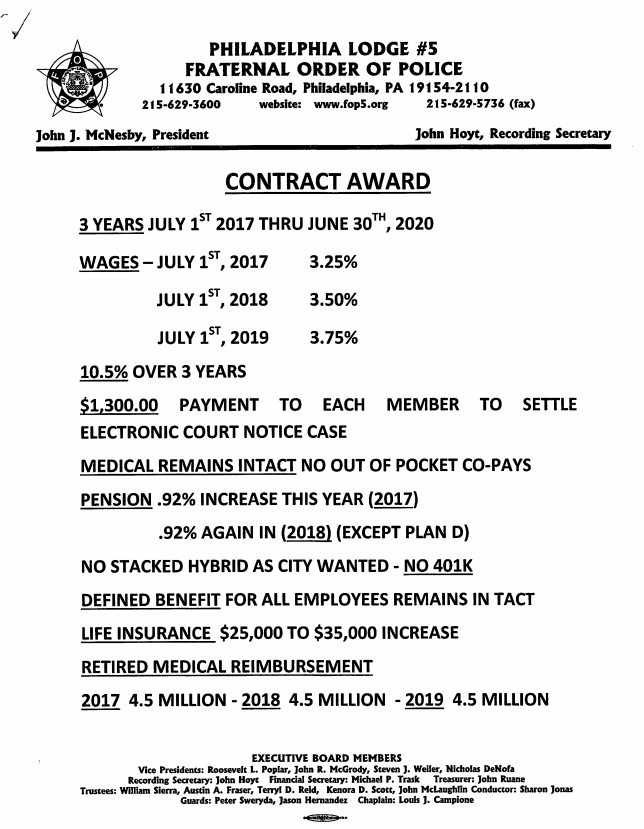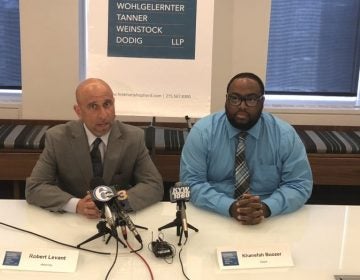Philadelphia police to get pay raises — and overtime controls — in new contract
The city and the union representing Philadelphia’s 6,400 police officers agreed on a contract today that raises pay 10.5 percent over three years, increases cops’ pension contributions, and includes operational changes aimed at curbing sky-high overtime costs.
The three-year, $245 million contract, by state law, was decided by a panel of three arbitrators (one each chosen by the city and the union, and a third neutral arbitrator appointed by the American Arbitration Association). The arbitrators reviewed thousands of pages of exhibits and heard testimony presented by both sides over several months before deciding what the contract should contain.
“Overall, I think it’s a fair deal for both sides, both the city and the FOP,” said John McNesby, president of the Fraternal Order of Police Lodge 5. “I think that they got some pension changes that they needed. We’re happy with the raises, and we’re happy with the medical, and everything else.”
City spokeswoman Lauren Hitt agreed: “I think we’re fine with the outcome. The way that it works with arbitration is you go in and make the best case that you can, and they tell you what you’re going to get. It’s not quite like a regular contract negotiation, where at the end you’re like, ‘OK, I’m happy, we can live with this.’ They kind of just tell you what you can live with. So we can live with it!”

The city declared victory on several measures, including its quest for pension reform. Officers will contribute .92 percent more to their pensions this year and again next year, adding up to more than $160 million going to the pension fund over the next 13 years, according to city and FOP data.
“With this award, the city has now achieved pension reform with its two largest unions,” Hitt said, referring to a contract already reached with AFSCME District Council 33.
Tweaking work rules, such as limiting summer vacations for new officers and adjusting officers’ schedules around large special events, also should help reverse ballooning overtime, Hitt said. Police overtime jumped 40 percent over the past four years, from $48.7 million in fiscal year 2014 to $68.4 million in fiscal year 2017, Hitt said.
City officials also fought for and won the right to deliver court notices electronically — although each officer will receive $1,300 to settle a grievance the union had filed to preserve in-person delivery of court notices. That adds up to a whopping $8 million, but Hitt said that should be wholly offset by a one-month delay in the city contributing to the FOP’s healthcare fund.
The FOP lost its bid to end a requirement that officers live in Philadelphia for their first five years on the job and in Pennsylvania thereafter.
Funding the police pay raises will require city officials to submit a revised five-year budget plan to the Pennsylvania Intergovernmental Cooperation Authority, which it approved last month, within the next 20 days.
Police critics have talked about using the police contract as a means to achieve reform.
But Hitt said officials have mostly worked outside the contract to enact sweeping reforms federal authorities recommended in 2015, after a spike in police-involved shootings prompted then-police Commissioner Charles Ramsey to seek a federal review.
Ramsey had long complained that union rules made it tough for him to remove problem officers — and keep them off the force.
The new contract offers a small measure of improvement in that regard, Hitt said, preventing fired officers who win their jobs back through arbitration from rejoining the force until they complete required psychological and drug tests and have up-to-date certification.
“It’s not as common as folks would think,” Hitt said, of fired officers returning to the job. “We had 85 officers dismissed from April 2012 through April 2016, and only nine of those were reinstated.”
WHYY is your source for fact-based, in-depth journalism and information. As a nonprofit organization, we rely on financial support from readers like you. Please give today.




